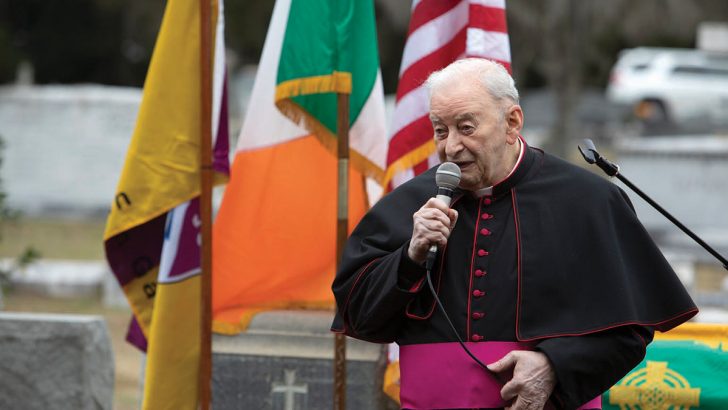Fr Peter Whelan’s compelling story of war-time ministry in the US is worth remembering, writes Chai Brady
It takes a brave man to remain a prisoner of war in order to continue ministering to defeated soldiers despite being offered freedom, but that, among many other selfless things, was what Fr Peter Whelan did during the American Civil War.
Born in 1802 in Foulkesmills, Co. Wexford, Fr Whelan acted as a chaplain to both Confederate and Union soldiers during the civil war. He previously served as a missionary in North Carolina and pastor of Georgia’s first Catholic parish, and twice served as administrator of the entire diocese of Savannah.
Peter Whelan (69) died on February 6, 1871 and precisely 150 years later, last month, a substantial crowd gathered around his tombstone in the Catholic Cemetery in the Diocese of Savannah, Georgia to recall and honour his exceptional career.
Life
Little is known of his early life prior to his attending Birchfield College in Kilkenny, where he received an education in the classics and mathematics before deciding to emigrate to America hearing God’s call in an appeal for priests to support the new Archdiocese of Charleston where he was ordained in 1830.
About a year after his release in a prisoner exchange, he was assigned to minister to the Union prisoners-of-war held at Andersonville”
Over the next 30 years Fr Whelan was a tireless shepherd of a flock which continued to grow exponentially, particularly due to the Great Famine which saw Ireland’s population drop by more than a quarter due to starvation, disease and emigration.
Speaking to The Irish Catholic, the Director of Irish Research and Teaching at Georgia Southern University, Dr Howard Keeley, said he personally became interested in the priest due to research he was conducting.
“My students and I were researching the strong links, forged in the mid-19th Century, between County Wexford and Savannah, due to a direct trade and emigration route between the two places. Numerous compelling stories emerged, including that of Fr Whelan, whose funeral procession was Savannah’s largest ever,” Dr Keeley said.
Memory
Asked why he thought it was important to honour the memory of Fr Whelan in particular, he said: “His humanitarian outreach was exceptional, especially given that it occurred in the context of America’s civil war. Not only did he steadfastly minister to the vast numbers of Union troops in the wretched Andersonville prisoner-of-war camp, he continued, after his months there, to help them from his pastoral base in Savannah.”
Fr Whelan initially ministered to Confederate troops, some of which were made up of Irish Catholics. He remained with them during the Union siege of Fort Pulaski and volunteered to remain with them during their imprisonment in New York in 1862 despite being offered his release.
About a year after his release in a prisoner exchange, he was assigned to minister to the Union prisoners-of-war held at Andersonville, Georgia, where he became known as the ‘Angel of Andersonville’.
Fr Whelan was stationed there between mid-June and late September of 1864. Dr Keeley states that under a burning sun, he cared for the Union army inmates, whose numbers exceeded 33,000, even though the place had been designed to accommodate only a third of that quantity.
Fleas and rats proliferated, as did scurvy, diarrhoea, and dysentery. The camp hospital maintained a gangrene ward. One prisoner, a Sergeant David Kennedy, labelled Andersonville a “hell on earth, where it takes seven occupants to make a shadow”.
Even after concluding his full-time ministry at Andersonville – where he sought to “allay misery” and “gain souls to God” – Fr Whelan remained engaged with the notorious site (officially called Fort Sumter). In January 1865, he travelled from Savannah to Americus, a distance of over 200 miles, to purchase flour with $16,000 in Confederate currency to provide sustenance for the inmates. The flour was baked into ‘Whelan’s bread’.
His humanitarian outreach was exceptional, especially given that it occurred in the context of America’s civil war”
Regarding his work in Andersonville, one prisoner said that “without a doubt he was the means of saving hundreds of lives”. Another described Whelan’s ministering to the sick: “All creeds, colour and nationalities were alike to him. He was indeed the Good Samaritan.”
Returned
After the war, Fr Whelan returned to Savannah as pastor of the new St Patrick’s church. He died just a few years later, on February 6, 1871, from a lung disease he is said to have contracted at Andersonville.
Many people in Wexford however, may not know much about his ministry and actions but there are efforts to preserve his memory.
Dr Keeley said: “It’s wonderful to know that two memorial plaques were erected to honour Fr Whelan in his home district in south County Wexford. I’m delighted that the people of the Model County have demonstrated such pride in a native son, a figure long and deeply revered in Savannah. In our time, which too often seems riven by political, racial, and economic fissures, Fr Whelan’s outreach to all men, regardless of affiliation, constitutes a sterling example of the fact that there is a better way.”


 Chai Brady
Chai Brady With the US, Irish, and Wexford county flags behind him, Msgr William Oliver O’Neill delivers his address at the commemoration of the 150th anniversary of the death of Fr Peter Whelan at the Catholic Cemetary in Savannah, Georgia.
With the US, Irish, and Wexford county flags behind him, Msgr William Oliver O’Neill delivers his address at the commemoration of the 150th anniversary of the death of Fr Peter Whelan at the Catholic Cemetary in Savannah, Georgia. 